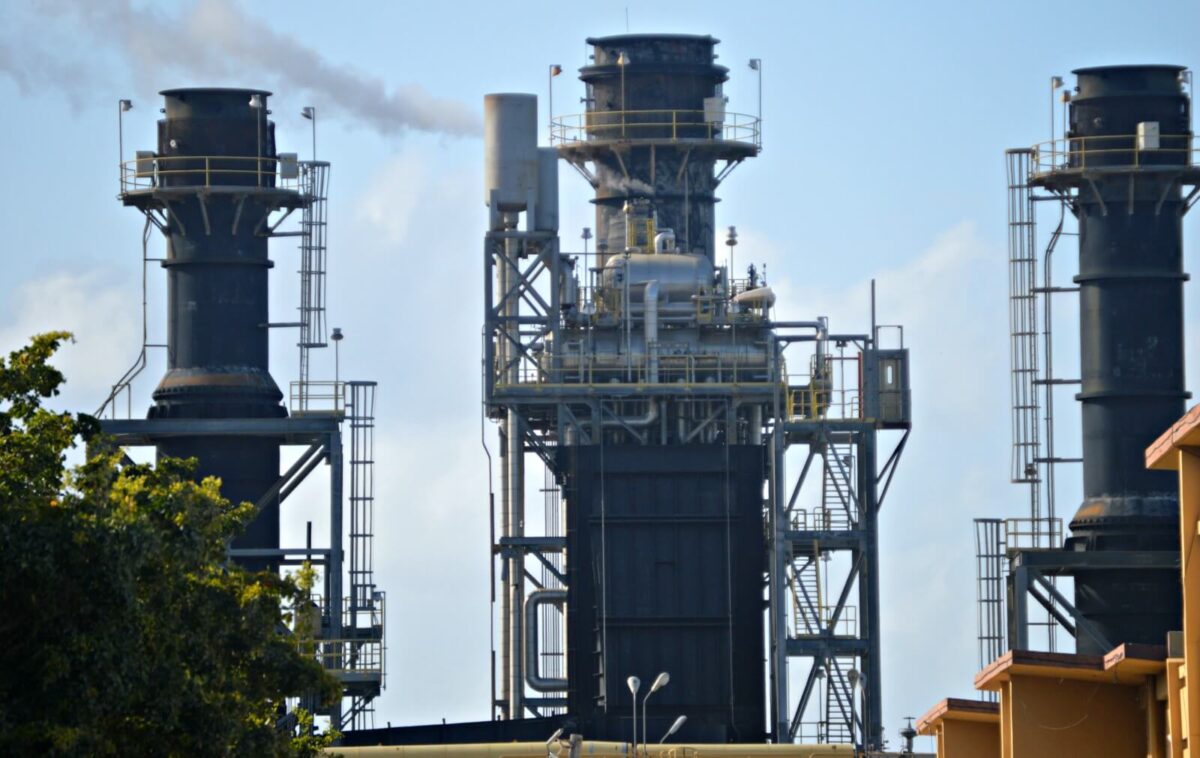![]()
The V.I. Water and Power Authority’s Richmond powerplant on St. Croix. By ERNICE GILBERT/ V.I. CONSORTIUM
Governor Albert Bryan may declare an energy state of emergency tied to the V.I. Water and Power Authority, an action the governor said is being weighed because of the unprecedented increase in the cost of fuel being driven by Russia’s invasion of Ukraine.
Speaking during an interview with the Consortium Sunday, Mr. Bryan said residents feeling pain at the pump would also see shocking increases in their electricity bills by way of the Levelized Energy Adjustment Clause, or LEAC, which is the cost of fuel to WAPA that is passed on to consumers.
Mr. Bryan described the increases in electricity bills as “imminent” and said his administration has been thinking of different ways to offset the cost. “We were set before to do it but this new development in Ukraine is a whole different ball game now. We were not expecting gas prices to increase by 30 to 40 percent,” he said.
The governor said while gas prices show the most immediate impact, other areas of the economy will be affected because of the importance of fuel in commerce. “We’re working on some plans now to determine what we’re going to do to respond on a whole, because it’s not only gas, it’s going to be reflected in food as well because transportation and energy cost more. So everything is going to increase as a result of this,” he said.
The governor said most of the plans to mitigate costs will focus on WAPA. “We cannot have the energy rate go to where it was before. And depending on what happens we might have to declare some kind of energy emergency,” the governor stated, though he had yet to decide what the declaration would entail.
The territory’s leader said he had given directives to WAPA leadership and the V.I. Energy Office asking for ideas on fuel cost mitigation, and said responses were due Monday. The governor referred to the fuel prices as “absolutely ridiculous.”
Currently, motorists on St. Croix are paying on average $4.50 for a gallon of unleaded regular gas; on St. Thomas some gas stations are selling a gallon of unleaded regular at $6, and St. John $5.
Other smaller actions currently being taken include the promotion of the use of electric vehicles. Mr. Bryan said he was “trying to get people off these gas guzzlers and get in line with what the president is doing, we’re doing the same thing.” He said he had a brief conversation with U.S. Energy Secretary Jennifer Granholm during a trip to Washington, where the two discussed the U.S. Virgin Islands being a great location for renewable energy demonstration projects. Mr. Bryan did acknowledge that such efforts were far off. “We need immediate assistance,” he said.
Additionally, the governor lamented spending the territory’s funds on stop-gap projects. “When I invest our money, I want to see projects that’s going to have long-lasting impacts. You know, I pay $20 million and then I don’t have nothing to show for it; all I did was buy fuel,” Mr. Bryan said, giving an example of what might happen if he were to simply subsidize the cost of fuel.
The cost of fuel, already up 45 percent for the year, continues to fluctuate based on developments in Ukraine. On Monday morning, the price of Brent Crude, which is the global benchmark, fell by $4 a barrel to $108.55 following news that Russia was willing to have substantive discussions about its war in Ukraine. If those talks fail and the situation on the ground escalates, the price of oil could surge further. If the talks go well, the price could tumble. Last week the price of oil closed above $130 a barrel.
The governor also pointed to solar energy plants powered by battery systems, the most popular being Tesla’s Power Electronics which has a high range of scalability. “The Powerpack system scales to the space, power and energy requirements of any site, from small commercial businesses to regional utilities. It can be configured in various arrangements, offering far more modularity than competing models,” reads a description of the system on Tesla’s website.
“If we could get the battery systems in that would help a lot,” Mr. Bryan said.
Delegate to Congress Stacey Plaskett in December 2019 called on Governor Bryan to declare WAPA a state of emergency, albeit regarding a different matter. At the time, the authority’s financial blunders had plunged the territory into a crisis situation, and Ms. Plaskett’s statement came one day after WAPA’s liquid propane supplier had suspended delivery of the crucial fuel source to the territory. At the time, Mr. Bryan agreed WAPA was in a crisis situation, but he was against the state of emergency declaration, stating that it would have “zero effect.”
On Sunday, Mr. Bryan — seeing firsthand the impact of the rising cost of fuel to consumers — kept the option open.

